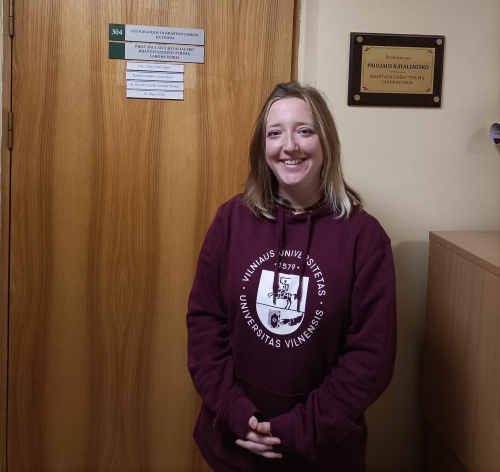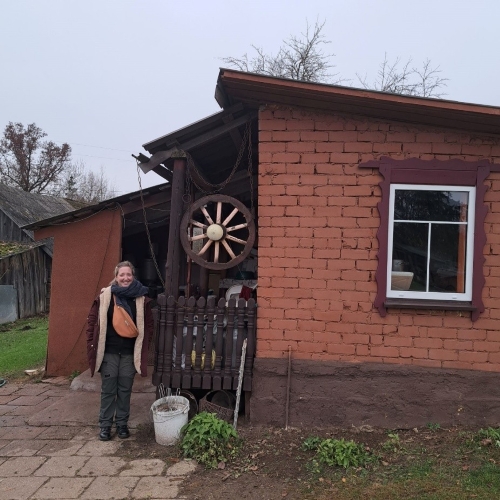
In 2024–2025, geographer Dr. Camille Robert-Boeuf completed a postdoctoral internship at the Institute of Geosciences of the Faculty of Chemistry and Geosciences of VU. Her research focused on the transformation of agricultural landscapes in Central Europe, especially in Lithuania and Poland. The postdoc was particularly pleased with the dynamic, open and welcoming atmosphere of the Department of Geography and Landscape Management. For more information about the intern's impressions, we invite you to read the interview.
Could you share your impressions of working at the Institute of Geosciences, Faculty of Chemistry and Geosciences, Vilnius University?
I worked for a year and a half (between 2024 and 2025) at the Institute of Geosciences and the Department of Geography and Land Management of Vilnius University. I worked particularly with my supervisor, Prof. Jurgita Mačiulytė. It was a delightful experience, during which I learnt a lot about Lithuanian rural geography. The university environment and the city of Vilnius were enjoyable.
How would you describe the atmosphere of collaboration with the lecturers of the Institute of Geosciences and the entire staff of the Department of Geography and Land Management?
The atmosphere of collaboration was good; people were very open and curious about my research. I specifically worked with colleagues from the PAScapes Centre (The (Post)Authoritarian Landscapes Research Centre): Prof. Jurgita Mačiulytė, Assoc. Prof. Ieva Misiūnė, Assoc. Prof. Ričardas Skorupskas, Prof. Darijus Veteikis, and Julius Mačiulaitis. I enjoyed working with them. In the department, Prof. Dovilė Krupickaitė gave me the opportunity to present my research and talk with the students. It was extremely valuable for me to exchange ideas with her and also with Assoc. Prof. Rasa Šimanauskienė.
More generally, I found a dynamic team of geographers who very well welcome foreign researchers like me. I also gained insight into the geography research dynamics in Lithuania and its educational methods, which was very enlightening. I understood how geographers work here and how they teach students. Indeed, there are some differences, but also some similarities with the French context.
I would like to express my gratitude to everyone for the warm welcome and assistance I received during my stay in Vilnius.
What is the main focus of your research, and what specific goals are you pursuing with it?
I have a PhD in social geography, with a specialisation in European peri-urban and rural areas. My previous research has focused on Russia and France, and I am currently concentrating on the transformation of agricultural landscapes in Central Europe, particularly in Lithuania and Poland. As part of the PAScapes Centre team, we aimed to understand the recent developments in the Lithuanian farming sector. We conducted a multi-scale analysis, and my particular interest was in the local scale. Alongside Jurgita Mačiulytė, we sought to move beyond mere statistics to explore the local changes occurring in small and medium-sized farms. To this end, we conducted around fifty interviews with farming families and visited farms. In the research team, my goal was to study the role of women in transforming Lithuanian agricultural landscapes and to compare this situation with that in Poland. Thus, I also conducted some interviews on Polish farms, particularly with Ukrainian female seasonal workers.
In what ways do you believe your research contributes to the field of modern geography and landscape management, or the broader scientific context?
My work has generated new insights into the changes occurring in agricultural landscapes and the living and working conditions of women in the Polish and Lithuanian farming sector. Together with Jurgita Mačiulytė, I have demonstrated that small farms have undergone significant transformations in recent years, resulting in changes to the landscapes they cultivate (changes in size, types of production, etc.). Moreover, I have highlighted that women play a vital and sometimes decisive role in the maintenance and renewal of these agricultural landscapes in both Lithuania and Poland.
From an epistemological perspective, I have collaborated with Jurgita Mačiulytė to demonstrate that conducting field surveys—such as interviews and observations on farms—is essential for clarifying and supplementing statistical data. Field surveys also offer valuable insights into statistical trends, as they uncover weak signals that may initially seem insignificant but are crucial for understanding farmers' work, their lifestyles, and the evolution of landscapes.

Camille Robert-Boeuf photo from personal archive
What are your immediate goals and future aspirations within your scientific research?
In the short term, I want to continue my work with my colleagues at the PAScapes Centre. We still have several results to publish, and I would like to extend some analyses and conduct additional field surveys. In the long term, I hope to foster collaborations between French and Lithuanian geographers, possibly by inviting French colleagues to Vilnius and vice versa.
What is the greatest professional achievement you have realized while working with the Institute of Geosciences and the staff of the Department of Geography and Land Management?
I have two significant achievements I would like to highlight.
The first is scientific: I am proud to have made some interesting initial findings regarding rural geography in Central Europe, with a primary focus on the role of women in the countryside.
The second achievement is more personal and relates to my academic career. Through my work at Vilnius University and my collaborations with the Department of Geography and Landscape Management, I successfully became a research fellow at the CNRS (Centre National de la Recherche Scientifique) after passing a highly competitive examination in France. Without this experience abroad at a prestigious research institute, I wouldn't have secured this job. Joining this Department and the Institute as a postdoctoral researcher has genuinely been a significant professional achievement for me.
